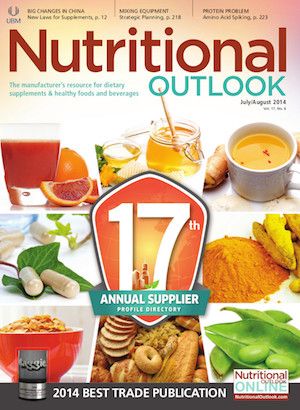Advice for the Next Head of FDA’s Division of Dietary Supplements
Two industry leaders offer advice to the next head of FDA’s Division of Dietary Supplements-whoever she or he may be.

FDA named William Correll interim head of Dietary Supplement Programs, following the April departure of former division head Dr. Daniel Fabricant. Correll hails from FDA’s Center for Food Safety and Applied Nutrition and is a 23-year veteran of the FDA foods program. Correll’s term remains unknown until FDA names a permanent division head.
In May, we sat down with Dr. Fabricant to talk about his new role as CEO of the Natural Products Association (NPA; Washington, DC). This month, we chatted with two industry leaders about what direction they’d like to see FDA’s Dietary Supplements Division take, especially now that its leadership is undergoing a changing of the guard.
What words of advice would you offer to the next director of the Division of Dietary Supplement Programs?
Al Powers, recently retired as CEO of the NOW Health Group (Bloomingdale, IL)
My advice would be to work collaboratively with the natural products industry to protect consumerism. Make consumer safety your main focus by devoting more resources to make an example of the bad actors. Actions taken against the bad actors will help compliance efforts in the long run. Reinforce the truth that has been stated by FDA in the past, that FDA has adequate regulatory enforcement power to protect consumers. We don’t need more laws, but better enforcement of existing laws.
Steve Mister, president and CEO of the Council for Responsible Nutrition (CRN; Washington, DC)
We hope that the next director will be aggressive in terms of his or her enforcement actions against companies not following the regulations, particularly those who are illegally marketing drugs as dietary supplements, or stimulant products that have not gone through the New Dietary Ingredient procedures.
We also hope that the director will have an open door with all supplement industry stakeholders, including the industry itself, recognizing that suppliers, manufacturers, and the trade associations that represent them may be in the best position to work cooperatively with the agency to ensure consumers have access to high-quality, safe supplements.
Where are the shortfalls at the FDA that need to be propped up or better funded?
Powers: The enforcement side. FDA already knows who the bad actors are, and they need to crack down on them.
Calls for more regulation that includes FDA registration or notification of all products in the industry are unnecessary and unfounded. Those who break the law will continue to break new laws.
Mister: CRN is a member of the Alliance for a Stronger FDA for the purposes of encouraging more funding for the agency to better protect consumers in all of the product categories that FDA oversees and regulates. FDA is the backstop when it comes to consumer safety. We understand the agency allocates its limited resources in a way that focuses on what it considers the riskiest problems, and because of that, supplements are often overlooked as the agency deals with other industries.
We need FDA to go beyond warning letters when stronger action is warranted, because without strong enforcement actions, responsible companies following regulations don’t have a level playing field, and bad actors leave consumers at risk and tarnish the reputation of the entire industry.
What dietary supplement or ingredient problems or opportunities would you like the next director to focus on?
Powers: There is a tremendous opportunity to improve the health of Americans by encouraging prevention and wellness. FDA could make a make huge impact by finding ways to get to “yes” instead of “no.”
Americans want natural and safer products to support their health and the freedom to choose. FDA should support consumer access to health information and label claims that will empower people to lead healthier lives. FDA and the health industry should have a common agenda to work together for the common goal to improve the health of Americans.
Mister: The biggest problem right now is companies that are marketing illegal drugs and calling them dietary supplements. These companies are engaged in criminal activity that is extremely dangerous for consumers, and we need the agency to move more swiftly and to punish more harshly those companies that are found to engage in this kind of behavior. These tainted products are illegal and deserve more than warning letters from the agency because they risk the health of consumers and injure the image of the legitimate supplement marketplace.
We also hope the FDA will increase its enforcement of the New Dietary Ingredient (NDI) provisions of the statute. CRN has been vocal in its opposition to some of FDA’s interpretations of the law with respect to its draft guidance document, but the statute is clear that [companies with] a new dietary ingredient must [notify] the agency. Too many companies ignore this requirement, and several recent controversial ingredients illustrate why the NDI provisions are in the law to protect consumers from potentially unsafe new ingredients. Even while we spar with FDA on nuance, the requirements of the law should be enforced. Otherwise, it allows critics of DSHEA to question whether this law is appropriate for supplements. We hope that the new director will consider these issues as top priorities.
What do you hope Dan Fabricant’s move back to NPA will mean for NPA and the industry? How could his presence at NPA help in collaborative dealings with other associations and with FDA?
Powers: I hope it will lead to greater stature for NPA’s influence in Congress and a wider representation of membership in the natural products industry.
I think his key challenges will be to: (1) Protect the industry from legislation that leads to unnecessary regulation, (2) Counteract the propaganda in the media that the dietary supplement industry is not regulated, (3) Increase NPA membership, especially in the natural food category, (4) Work with the trade associations and FDA to formulate a guidance document on NDIs that truly represents the intent of DSHEA, (5) Push for the ability to make science-based health claims for natural foods and supplements that will benefit consumers, and (6) Develop a definition of natural products that will protect and inform consumers who rely on our industry to be the gatekeeper.
I also would like to see NPA call for a ban on [genetically engineered] crops intended for human consumption and animal feed in the United States. This is the root cause of the GMO problem, and it would have broad support in our industry and with consumers. Radical action is necessary since GMOs are a constant threat to the sustainability of organic crops.
Photo © iStockphoto.com/ImageGap

HHS announces restructuring plans to consolidate divisions and downsize workforce
Published: March 27th 2025 | Updated: March 27th 2025According to the announcement, the restructuring will save taxpayers $1.8 billion per year by reducing the workforce by 10,000 full-time employees and consolidating the department’s 28 divisions into 15 new divisions.
DOJ asks Utah court to dismiss FTC lawsuit against Xlear Inc.
March 11th 2025On March 10, the DOJ and the defendant filed a stipulation to dismiss with prejudice the lawsuit in which each party agrees “to be responsible for its own costs and fees and agrees that no party shall be responsible to any other party for any fines, costs, fees, or penalties arising from this case.”
















